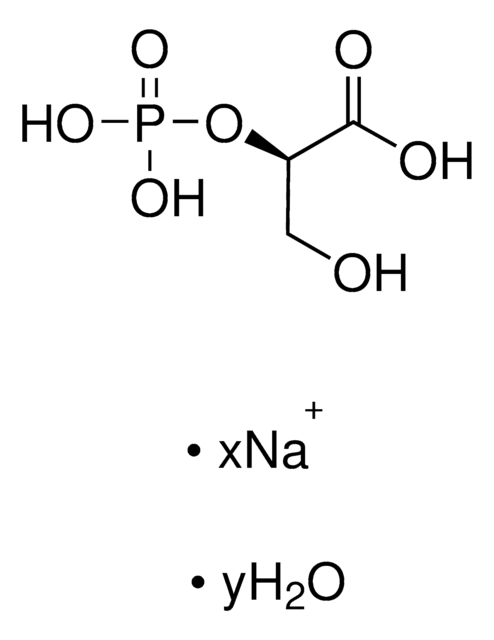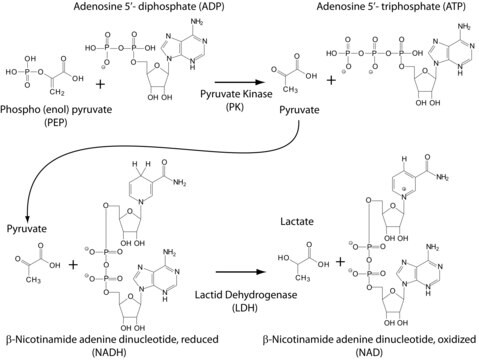C1744
Phosphoenolpyruvate carboxylase microbial
≥5.0 unit/mg solid
Synonym(e):
PEPC
Anmeldenzur Ansicht organisationsspezifischer und vertraglich vereinbarter Preise
Alle Fotos(1)
About This Item
Empfohlene Produkte
Form
lyophilized powder
Spezifische Aktivität
≥5.0 unit/mg solid
Mol-Gew.
~390 kDa
Lagertemp.
−20°C
Anwendung
Phosphoenolpyruvate carboxylase (PEPC) is an enzyme useful for enzymatic determination of carbon dioxide when coupled with malate dehydrogenase in clinical analysis. PEPC is also used to study carbon assimilation, post-translational regulation and allosteric regulation in various plants .
Biochem./physiol. Wirkung
Phosphoenolpyruvate carboxylase (PEPC) catalyzes the addition of bicarbonate to phosphoenolpyruvate (PEP) to form the four-carbon compound oxaloacetate and inorganic phosphate . In CAM and C4 plants, PEPC catalyzes the photosynthetic assimilation of CO2 into an organic acid. PEPC is activated by glucose-6-phosphate and is inhibited by malate and aspartate. PEPC comprises about 0.5-2% of the soluble protein in alfalfa and soybean nodules .
Einheitendefinition
One unit causes the oxidation of one micromole of NADH per minute at pH 8.0 at 30°C.
Physikalische Form
White amorphous lyophilized powder containing BSA and sugar alchohols as stabilizers.
Signalwort
Danger
H-Sätze
P-Sätze
Gefahreneinstufungen
Resp. Sens. 1
Lagerklassenschlüssel
11 - Combustible Solids
WGK
WGK 1
Flammpunkt (°F)
Not applicable
Flammpunkt (°C)
Not applicable
Analysenzertifikate (COA)
Suchen Sie nach Analysenzertifikate (COA), indem Sie die Lot-/Chargennummer des Produkts eingeben. Lot- und Chargennummern sind auf dem Produktetikett hinter den Wörtern ‘Lot’ oder ‘Batch’ (Lot oder Charge) zu finden.
Besitzen Sie dieses Produkt bereits?
In der Dokumentenbibliothek finden Sie die Dokumentation zu den Produkten, die Sie kürzlich erworben haben.
Kunden haben sich ebenfalls angesehen
Mika Nomura et al.
Plant & cell physiology, 47(5), 613-621 (2006-03-10)
Phosphoenolpyruvate carboxylase (PEPC, EC 4.1.1.31) is believed to play a significant role in supporting nitrogen fixation via anaplerotic CO2 fixation for recycling carbon in nodules. Using the antisense technique, we decreased the expression levels of the nodule-enhanced PEPC gene (Ljpepc1)
Masataka Wakayama et al.
Journal of plant research, 126(2), 233-241 (2012-10-18)
The C(4) grass Arundinella hirta exhibits a unique C(4) anatomy, with isolated Kranz cells (distinctive cells) and C(4)-type expression of photosynthetic enzymes in the leaf sheath and stem as well as in the leaf blade. The border zones between these
Patrizia De Nisi et al.
Plant physiology and biochemistry : PPB, 57, 168-174 (2012-06-19)
The regulation exerted by the Fe status in the plant on Fe deficiency responses was investigated in Cucumis sativus L. roots at both biochemical and molecular levels. Besides the two activities strictly correlated with Fe deficiency response, those of the
Jitender Singh et al.
Gene, 500(2), 224-231 (2012-06-20)
Phosphoenolpyruvate carboxylase is an ubiquitous cytosolic enzyme that catalyzes the ß-carboxylation of phosphoenolpyruvate (PEP) and is encoded by multigene family in plants. It plays an important role in carbon economy of plants by assimilating CO2 into organic acids for subsequent
Judith Katharina Paulus et al.
Nature communications, 4, 1518-1518 (2013-02-28)
The C4-photosynthetic carbon cycle is an elaborated addition to the classical C3-photosynthetic pathway, which improves solar conversion efficiency. The key enzyme in this pathway, phosphoenolpyruvate carboxylase, has evolved from an ancestral non-photosynthetic C3 phosphoenolpyruvate carboxylase. During evolution, C4 phosphoenolpyruvate carboxylase
Unser Team von Wissenschaftlern verfügt über Erfahrung in allen Forschungsbereichen einschließlich Life Science, Materialwissenschaften, chemischer Synthese, Chromatographie, Analytik und vielen mehr..
Setzen Sie sich mit dem technischen Dienst in Verbindung.









